May 08, 2025
Cast member Ariyon Bakare, director Makalla McPherson and writer Inua Ellams share their experiences of The Story & the Engine!
In the fifth episode of Season 2, the Doctor and Belinda encounter a mysterious man, known as ‘The Barber ’, in Lagos, Nigeria – and he has a story to tell. Involving a dangerous barber shop, giant spiders and “a lot of hair”, the next adventure brings the Doctor to Nigeria for the first time on screen..
We spoke to writer Inua Ellams, director Makalla McPherson and the Barber himself, Ariyon Bakare, about what to expect in The Story & the Engine.

Ariyon Bakare (The Barber)
How did you come to be cast in Doctor Who?
It came as a wonderful surprise as they approached me directly for the part. My agent called with the offer to return to the Whoniverse. I was worried that they had forgotten I had been part of the franchise before, but then they remembered I was in full prosthetic as Leandro in The Woman Who Lived. After my experience playing Leandro, I was delighted to step back into that world. It was an instant yes.
How did you feel when you were told you got the part of the Barber?
Thrilled! Barber was right up my alley. I was particularly excited because Inua Ellams wrote the script. His writing has such depth and cultural richness - his storytelling is poetically sublime in a way that's uniquely his. I couldn't wait to dive into this character.
Was it hard to keep the secret of your casting from your friends and family?
Absolutely. I was bursting to tell my friends but had to keep it to myself until the official announcement. I felt like Clark Kent, having the best superpower ever and not being able to share it with the world; it was fun. I’d make a great spy!
Were you a fan of the show before?
Yeah, I was a big fan as a kid. I would collect Doctor Who cards that you’d get in cereal boxes. I loved the Daleks, of course, but I was also a huge fan of the Cybermen.
What do you think makes Doctor Who so special?
Doctor Who is genius because it literally built change into its story with the whole regeneration concept. More than being quintessentially British, it always stays fresh with new faces, new companions, and new creative teams. I love how it can be whatever it wants - one week, you might get a historical episode, then suddenly it's a creepy thriller, then boom - full-on sci-fi the next. But what makes it stand out is its hopefulness about people. At its heart, the show believes we can be better and that compassion and intellect matter more than violence. It's this amazing mix of wild imagination, hope, and constant reinvention that keeps fans coming back for decades.
What was it like working with Ncuti Gatwa and Varada Sethu?
You have two incredible young actors of their generation. I can only imagine that stepping into the shoes of these iconic roles, a mainstay of British culture, is quite a daunting feat. Yet together, they manage to do it with an effortless joie de vivre, making it modern and accessible to a new generation of Whovians. I love them. Their chemistry on screen is a joy to watch. Varada's smile can melt any viewer's heart. Now, blend that with Ncuti’s wit and charm, you create instant screen magic.
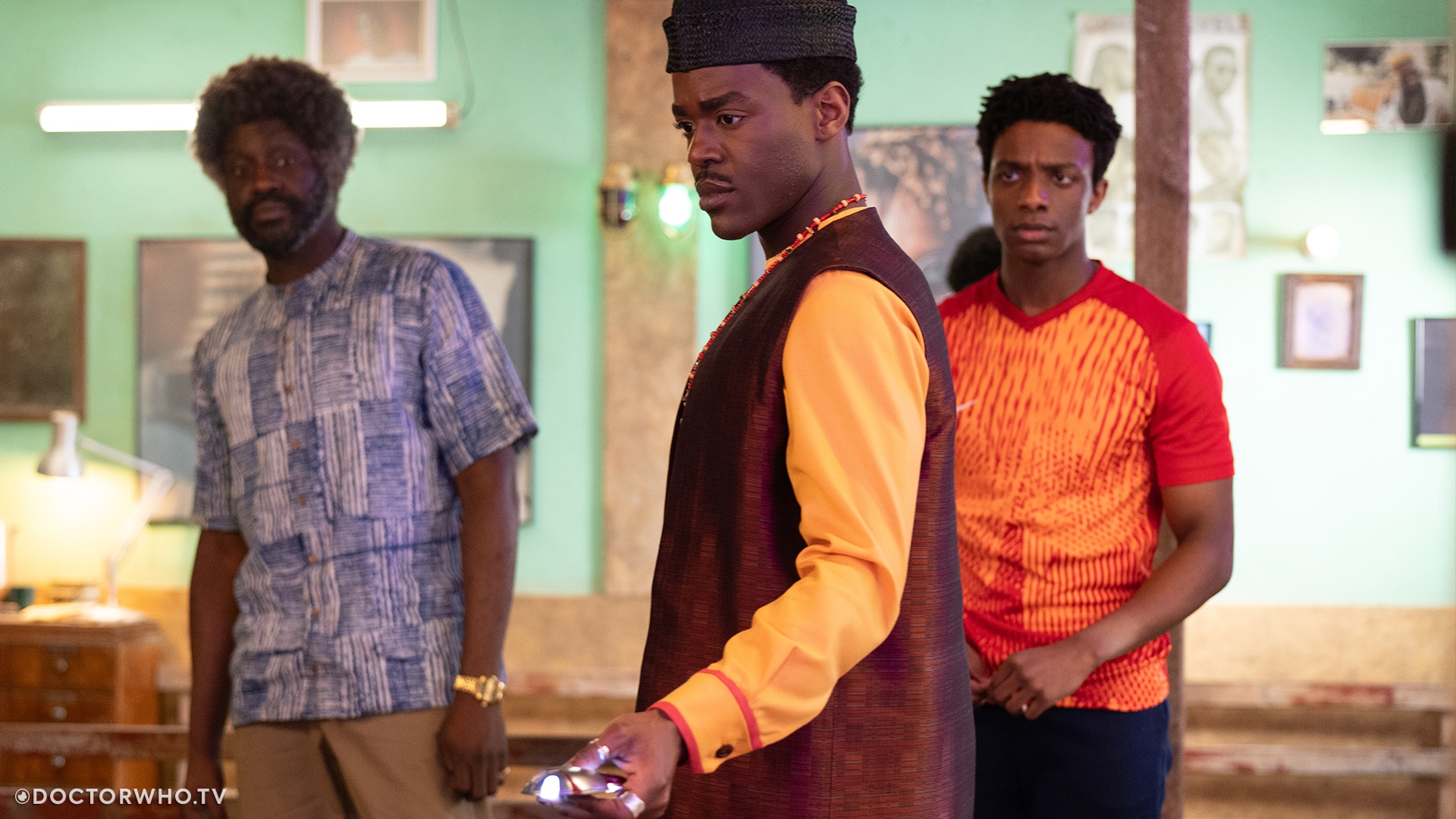
What was it like working on the Doctor Who set?
I love the Doctor Who set; the production design is always on point. The attention to detail is incredible. When you enter the set, your first reaction is 'woah' and 'wow.' Your second reaction is, 'Where's the TARDIS?' and 'Can I get a picture next to it, on it, and inside it?' I had just returned from Nigeria, maybe two weeks before we started shooting. The attention to detail amazed me when I stepped onto the set. They recreated parts of Nigeria; the colours of the walls, the red earth, and the props were replicated with such precision that it showed how talented the production design team are and how much effort and care is put into creating an authentic setting for us actors.
The TARDIS lands in Lagos, a place the show has never been before; how was this to film?
What I love about this episode is its cultural depth. Inua's script is steeped in Nigerian culture; it tells a story about storytelling and the origins of stories - the power they hold to heal, educate, and inspire. The Nigerian cultural element is authentic; the barbershop serves as a hub of conversation where these stories are shared. Inua brilliantly employs old Nigerian folktales, those bedtime stories we all heard as children, and creates a timeless piece that is Nigerian in essence but universal in appeal. For me, it demonstrates that all stories are significant; stories are not diminished by culture, race, or geography. Good storytelling is simply that - no one story is less relevant than another. In the end, it reminds us that whether across galaxies or cultures, our shared stories are what truly make us human.
What else can audiences expect to see from this episode?
Hair, lots of hair.
Where would you go if you could travel in the TARDIS to any time and place in the universe?
This is a particularly hard question to answer. James Baldwin once said, “Once you find yourself in another civilisation, you're forced to examine your own.” With this knowledge, I travelled through so many eras via literature, art, and films. But there are many that I would have loved to inhabit physically. I’d love to have experienced everything from Ancient Greece to the Harlem Renaissance. Finally, I’ve landed on the “Années Folles" (The Crazy Years) in 1920s Paris, the Jazz Age. The civil rights era of the 1960s sits right alongside it.
What would it be if you had to describe the episode in one word or phrase?
A time-bending Cultural Ancestral Collision.
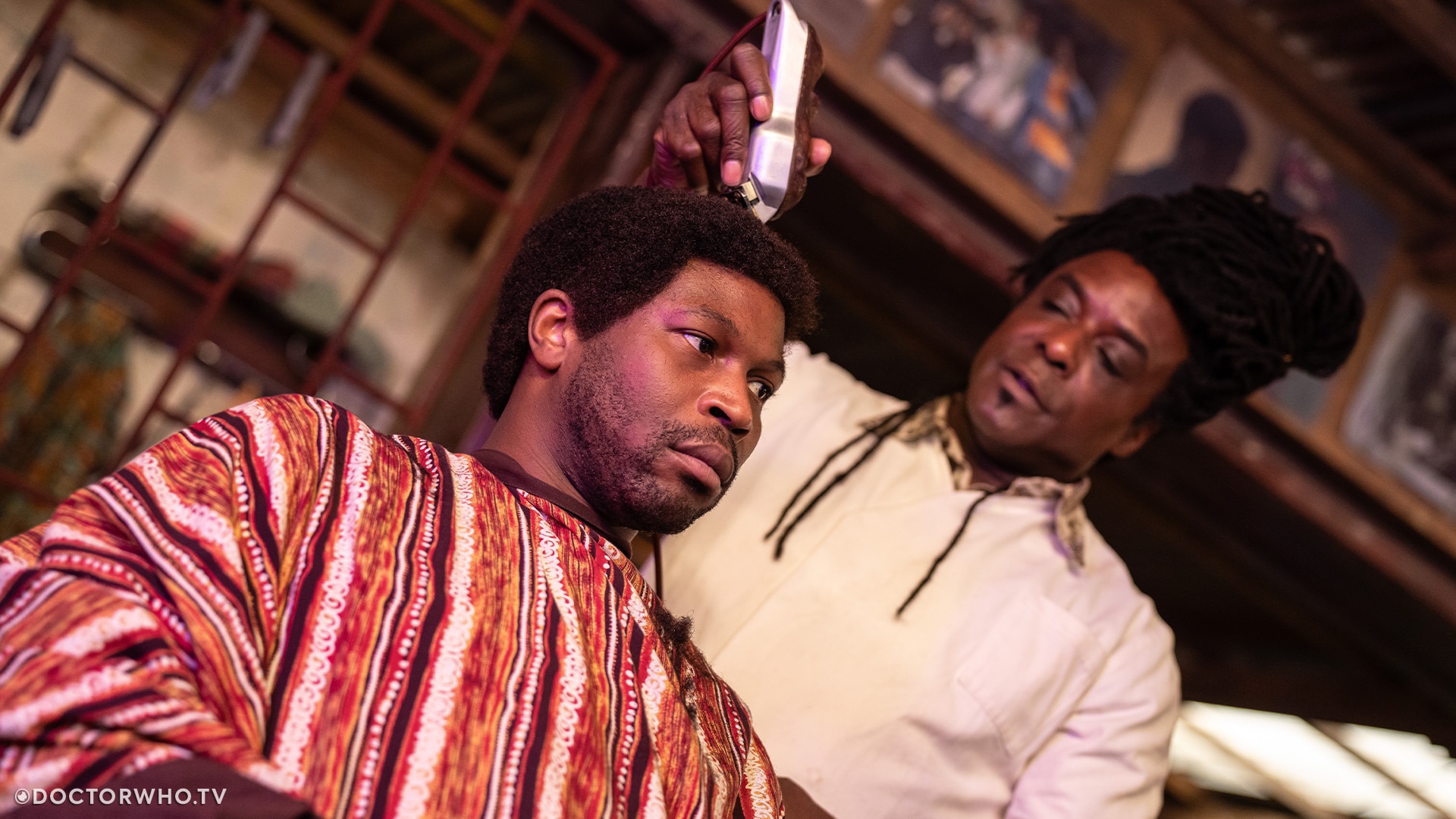
Makalla McPherson (Director)
What can audiences expect from this episode?
Audiences can expect something bold, poetic, and deeply rooted in culture. We take the Doctor out of his usual world and bring him to Nigeria—which immediately shifts the energy and opens up new possibilities. Inua Ellams wrote a truly unique script with a very distinct tone.
The episode is fast-paced, filled with rich cultural references, and led by a brilliant ensemble cast—including the incredible Ariyon Bakare and Sule Rimi. Tonally, it dances between emotional intimacy and uncertainty, touching on themes of friendship, identity, and community. There’s also a dark, gritty undercurrent that gives the story real weight.
It was a joy to bring to life, and I’m so grateful to the team who made it happen. There were definitely some challenges in the shoot, but everyone came together with passion and care, and I’m incredibly thankful for that.
Can you tell us about the process of creating this episode?
My starting point was always the script—understanding the story beats, the characters, the emotional spine, and asking what we could show rather than tell. Most of the episode takes place in a single location—a barber shop—with an ensemble of eight strong actors. So the challenge was: how do we keep this dynamic, fresh, and visually engaging?
We used a tool called Previs (previsualisation technology), which let me step into the set virtually using a 3D headset. That meant I could block scenes, map out camera movement, understand scale, and decide where props and action would go, all before the set was built. It gave us a clear blueprint and allowed us to be bold with how we used the space.
Working with designer Phil Sims was also key—he was instrumental in helping bring the cultural world of the episode to life, with authenticity and imagination.
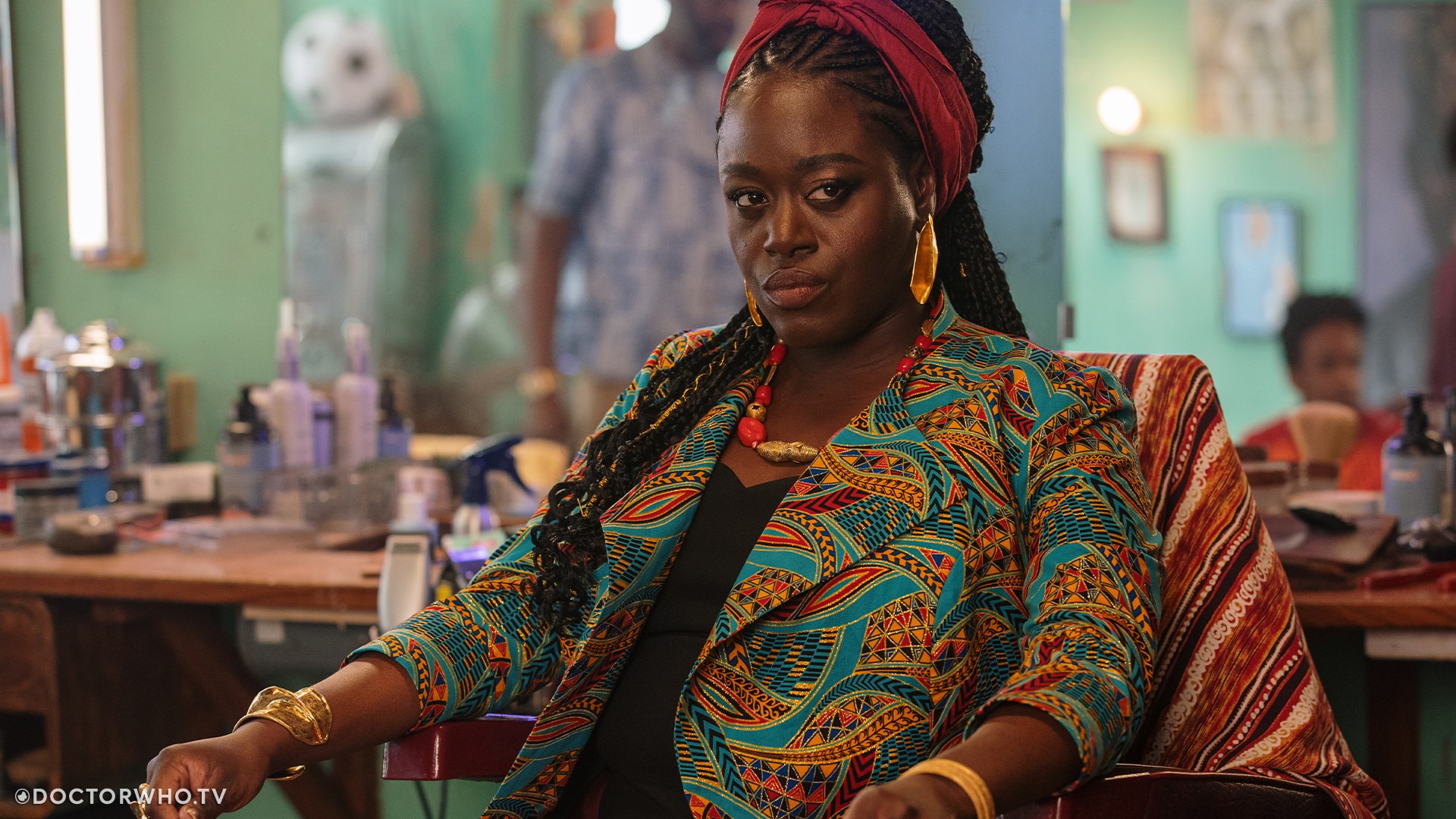
How was it to work on Doctor Who?
I absolutely loved it. I had an incredible time. I’ve been a huge fan of Russell T Davies for years, so to collaborate with him was a real privilege. He was supportive and generous from the start. I remember him saying, “Every episode is like a film—make it your own. Put your stamp on it.” That freedom to be expressive while still honouring the legacy of Doctor Who was amazing.
The scale of the production is phenomenal. Walking into Bad Wolf Studios and seeing the ambition behind the sets, the craftsmanship, the sheer number of people working tirelessly behind the scenes—it was awe-inspiring. And despite its size, the show really feels like a family. Everyone is working towards the same goal: to make something extraordinary.
How was it working with Ncuti and Varada?
It was a real pleasure. Varada is such a talented actress—thoughtful, open, and really collaborative. She brought so much depth to her character. And Ncuti is just electric. He’s determined to make this Doctor his own, and he brings real care and precision to every choice.
As a director, your role is to support them—guide when needed, but mostly create a space where they can shine. They were both open to collaboration and committed to delivering something special. It was a joy to share the space with them.
If you could travel anywhere in time and space, where would you go?
I’d go back in time—to the Eighties. I was born then, but I’d love to have lived through it as an adult. I love the fashion, the vibe, the energy. There’s something nostalgic about that era that feels lost today. I like the idea of slowing life down and going back to basics.
If you could sum up your episode in one word or phrase, what would it be?
Poetic.
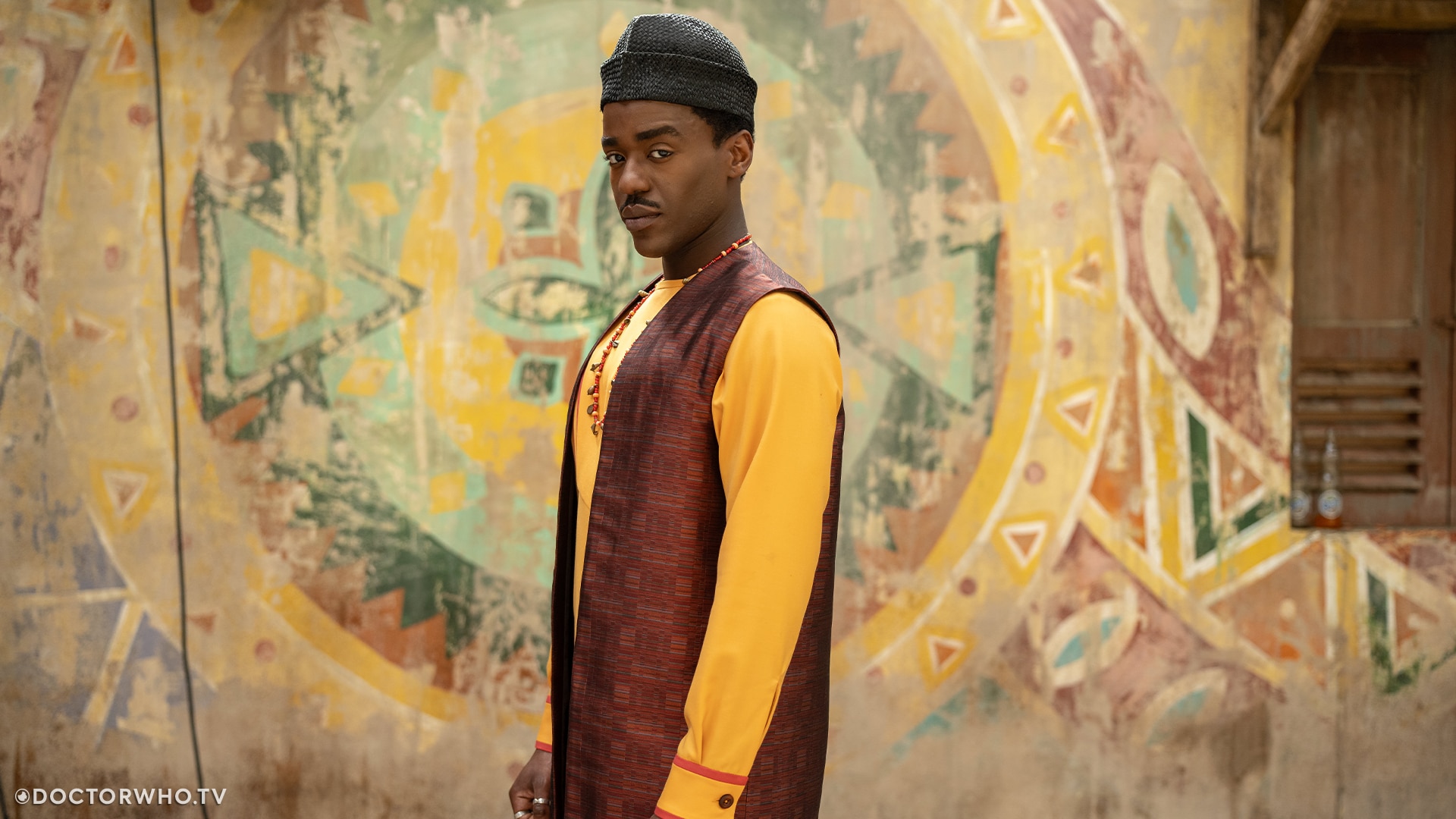
Inua Ellams (Writer)
Welcome to the Whoniverse. How did your involvement in Doctor Who come about?
I got really excited when it was announced Russell was returning as I’m a huge fan of his work. I dropped him a message. All I said was that I’m really excited by what you’re going to do next, I’m a huge fan of your work and I can’t wait to watch the next series. Within an hour, Russell responded saying “Inua, I’m a huge fan of your work, would you come and write for us?” I said “Absolutely!”. I went up to meet him and we chatted and set up an idea, and it began burrowing away.
Have you always been a fan of Doctor Who?
Yeah, I’ve been watching since I was ten years old in Nigeria. I’m a huge fan. There was a long hiatus when there was nothing happening. Then when the show returned, I watched most of them.
What is the process of writing an episode of Doctor Who? Is it different to what you’ve done before?
The turnover time is faster. A play takes me five or six years to write, but we had to do this in a relatively short time - in about a year. It’s also very different from writing a regular drama, when much of the information and storytelling comes out through dialogue. You have to think pictorially. It took me some time to really boil down into that. I had really great script editors, particularly David Cheung, who worked with me diligently across the script. Russell’s vast knowledge and experience and input was, without a doubt, viscerally important to writing it.
I really liked working with Russell. There was something the previous showrunner said to me, Chris Chibnall, which I think is true: “Doctor Who is a sci-fi and horror for eight years old, but also for all ages.” I kept that in mind. What would terrify an eight-year-old, but what’s also fun and exciting. How do you honour as much of what has come before, whilst creating new things for a new generation? It was great to grapple with and I had so much fun.
What can you tease about the episode you’ve written?
It’s entirely set in mostly one location. The moral of the story is to give credit where it’s due. And I took that little idea and expanded it, and really drew it out. It is a huge story, but also a very simple that sits on a lot of social history. It’s one location, a lot of fun, a lot of mythology written into it, but a new myth too.
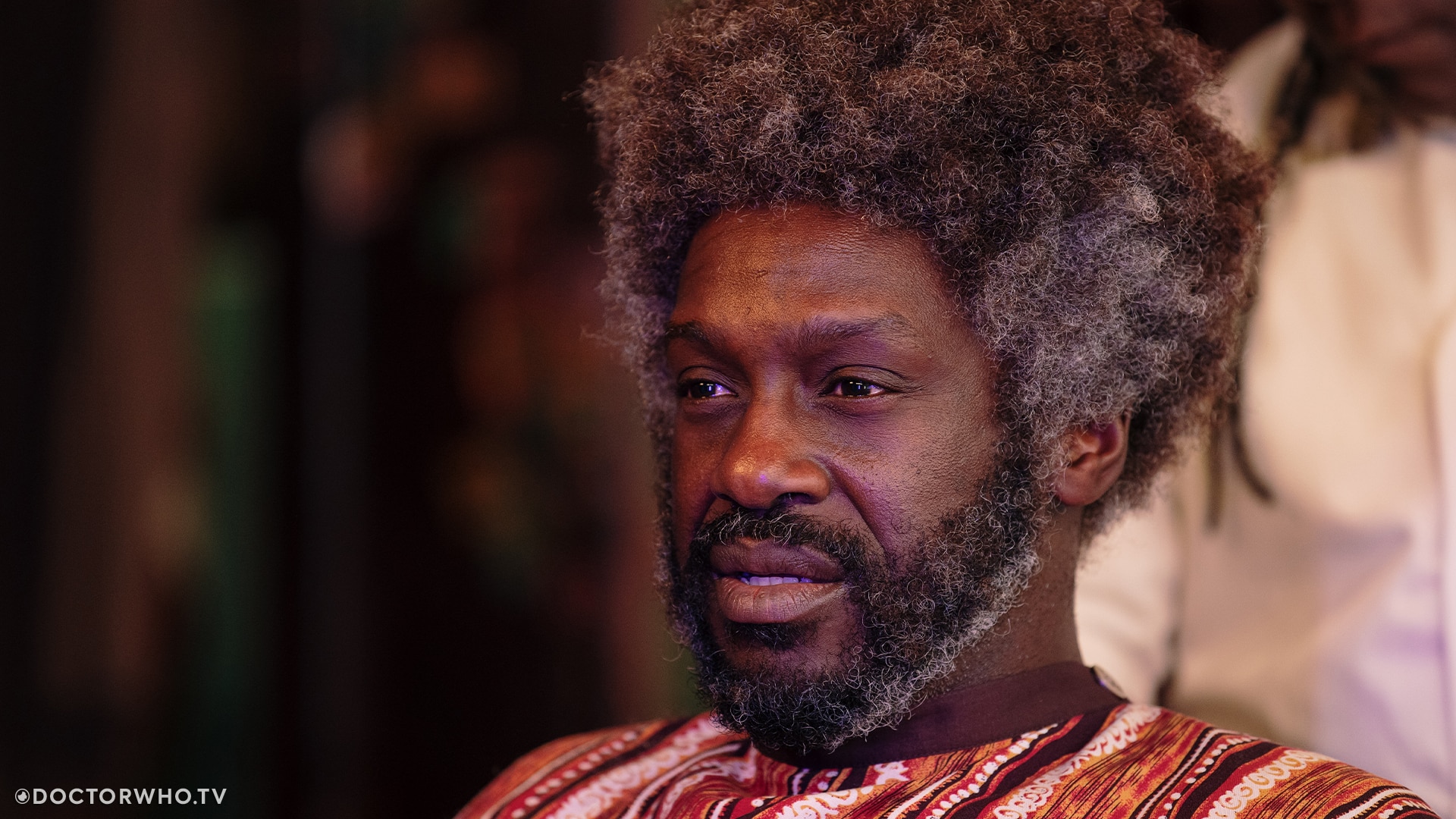
What does it mean to you to set this story in Lagos, and why did you choose the barber shop?
I was a kid in Lagos when I started watching Doctor Who. The show taught me to really dream beyond my present reality, to go across the universe, to leap into incredible adventures. When I became a displaced person and an immigrant, I forgot about what it felt like to be in Nigeria. Sixteen years passed before I returned to visit as an adult, and something began to nestle and settle into my body.
My body remembered a way of being, a sense of freedom. So, to take Doctor Who, this Doctor particularly, to Lagos sort of felt like stretching an olive branch out to the Inua who lived there three decades ago.
I guess what I’m trying to show is a little bit of the magic of Lagos, a little bit of the sparkles that exist when you choose to discover it. Doctor Who is full of incredible stories, and this is what happens in barber shops. Incredible stories are told. So, I was trying to unite them all.
What was it like writing for the Doctor and Belinda?
Ncuti and Varada brought so much joy and tenderness to the script I had written. Early in the drafts, I tried to make fun of the fact that he’s called the Doctor and she’s a nurse, I tried to play out a sort of buddy-cop relationship, but I quickly realized, there was much more at play, and something deeper between them.
The series starts off with Belinda determined to get home, the Doctor trying everything he can to get her home, and the frustrations all that causes. There’s a shift in this. Compared to other companions, Belinda doesn’t want to go on adventures. She loves her work, she wants to do her work, she’s thrown into this adventure. Most companions decide to go with the Doctor but Belinda doesn’t have a choice. Keeping that in focus really underpinned the decisions I made about how the characters talk to each other.
If you could travel in the TARDIS to any time or place in the Universe, where would you go?
I’ve talked about going to see the Pyramids when they’re being constructed, eyeing the blueprints so we could build them now. That’s still top of my list.
If you could describe your episode in one word or phrase, what would it be?
It’s a call to artists and creatives, to always give credit where it’s due.
The Story & the Engine debuts on Saturday 10th May on BBC iPlayer in the UK and Disney+ where available. Find out more about Season 2 here.









